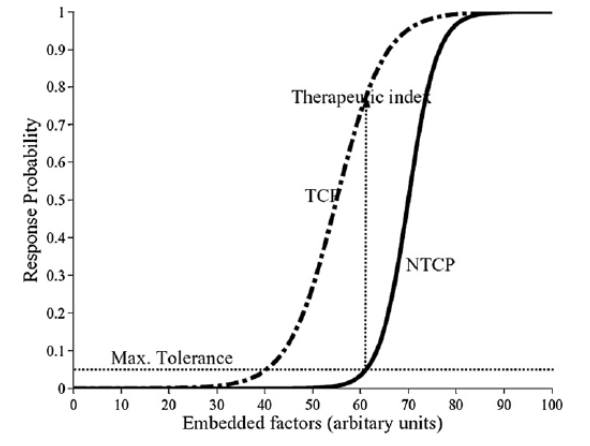Prof. Chang’s sensor convergence team at KI IT convergence is working on medical physics research in collaboration with local university hospitals. Radiation therapy is one of the important modalities in the fight against cancer. More than 60% of cancer patients undergo radiation therapy worldwide. The most important parameter associated with radiation therapy is the tumor control probability (TCP). The TCP represents the cure rate of radiation therapy and is the most important indicator of the treatment plan. However, the TCP increases with the prescription dose but, it is limited with regard to its use to increase the prescription dose owing to side effects. External beams definitely affect normal tissues which surround the tumor. Thus, increasing the TCP also causes radiation-induced side effects.

The NTCP is the probability that critical normal tissue undergoes complications as calculated by the combined effect of the radiation dose and volume. Generally, the dose volume histogram (DVH) is widely accepted to limit and control radiation-induced side effects. However, it is not easy to generalize with the DVH because the radiation effect is different for each organ. In clinics, constraints are used to optimize the treatment plan on the DVH, but different organs have different reactions such that constraints need to be studied for all different organs. The different characteristics of organs are referred to as the seriality of organs. More serial organs linked to higher radiation doses in small area are critical, and vice versa for parallel organs. It is not easy to represent the seriality with constraints because constraints are only a set of parameters in the DVH. The NTCP is calculated with the three parameters of n, m and TD50. The parameter n determines the seriality of the organ and other parameters can be used to formulate the probability curve. The NTCP model can describe side effects using patient data for suitability to local facilities.
According to Dr. Choi, who is in charge of the medical physics research team, “NTCP is a very powerful tool to understand the side effects of radiation therapy at local hospitals. This will improve the treatment quality at national hospitals. Recent studies in hadrontherapy centers have shown that the NTCP can be used to suggest more suitable treatment techniques between radiation therapy and hadrontherapy so that patients will be treated better at a lower cost in the future.” NTCP research is one of the brand new research areas among clinical studies and will boost research-clinical collaborations in radiation therapy.

Kyungdon Choi KI for IT Convergence, Integrated Sensor Team
Homepage: https://itc.kaist.ac.kr/
E-mail: hojoungc@kaist.ac.kr






